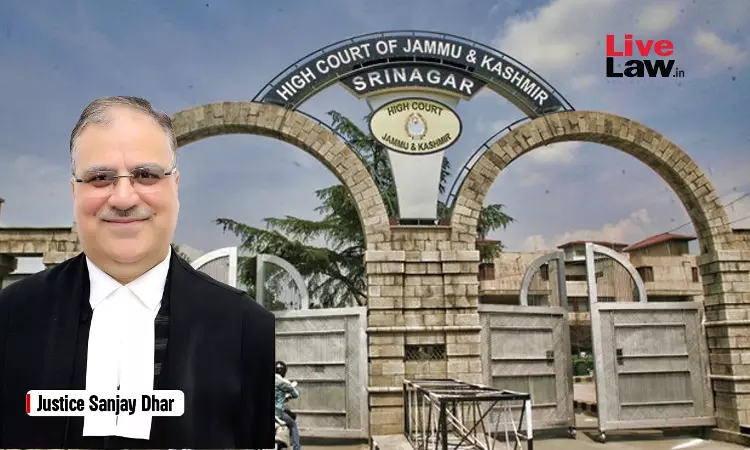- Home
- /
- High Courts
- /
- High Court of J & K and Ladakh
- /
- CCS (CCA) Rules | Once Delinquent...
CCS (CCA) Rules | Once Delinquent Employee Unequivocally Admits To Charges, Full-Fledged Enquiry Is Not Necessary: J&K High Court
LIVELAW NEWS NETWORK
7 Jun 2025 2:00 PM IST
Reinforcing the principle that disciplinary proceedings need not culminate in an elaborate enquiry when the delinquent admits to the charges, the High Court of Jammu & Kashmir and Ladakh has held that once the delinquent employee unequivocally admits to the charges in disciplinary proceedings, a full-fledged enquiry involving oral evidence and cross-examination is not necessary.This...
Reinforcing the principle that disciplinary proceedings need not culminate in an elaborate enquiry when the delinquent admits to the charges, the High Court of Jammu & Kashmir and Ladakh has held that once the delinquent employee unequivocally admits to the charges in disciplinary proceedings, a full-fledged enquiry involving oral evidence and cross-examination is not necessary.
This observation was made by Justice Sanjay Dhar while upholding the penalty of compulsory retirement imposed on Mushtaq Ahmad Khan, a re-engaged ex-serviceman employed under the Bureau of Civil Aviation Security.
Background of the Case:
The case arose out of a service-related dispute involving Mushtaq Ahmad Khan, who had initially served in a paramilitary force and retired in 1999. He was re-engaged in 2003 under the Ex-servicemen category and posted at Srinagar International Airport. During his tenure, a complaint was filed against him by one Sajida Alia Tabasum, who alleged that Khan had subjected her to physical and mental cruelty and had kept her in the dark about his earlier marriage with Sarwar Jan, which was still subsisting at the time of their wedding.
Following the complaint and his subsequent arrest in connection with an FIR lodged at Police Station Kupwara, Khan was placed under suspension. Thereafter, on October 3, 2023, an order was passed by the disciplinary authority imposing on him the penalty of compulsory retirement much ahead of his scheduled superannuation in November 2025. Aggrieved, Khan approached the High Court by way of a writ petition, contending violation of due process.
Assailing his compulsory retirement, Khan submitted that no regular departmental enquiry had been conducted before passing the impugned order. He added his second marriage was valid under Muslim personal law, and therefore, prior permission from the department was not necessary.
On the other hand, the respondents, represented by Mr. T.M. Shamsi, DSGI, contended that Khan entered into a second marriage during the subsistence of the first without seeking prior permission from the competent authority, thereby violating Rule 21 of the Central Civil Services (Conduct) Rules, 1964. A formal disciplinary process under Rule 14 of the CCS (CCA) Rules, 1965 was duly followed, and the penalty of compulsory retirement was imposed only after considering the petitioner's own admissions and the findings of the enquiry officer, he argued.
Court's Observations:
Justice Dhar began by examining the legal foundation of the penalty imposed. The Court noted that the core allegation against the petitioner was that he had contracted a second marriage without first obtaining the permission of the competent authority, during the subsistence of his first marriage a clear violation of Rule 21 of the CCS (Conduct) Rules, 1964. The said rule mandates prior government sanction for second marriages, even if such a union is permitted under personal law.
Turning to the petitioner's claim that no enquiry was conducted, the Court found this assertion factually incorrect. It noted that a show-cause notice was issued on August 26, 2021, to which Khan replied, admitting that he had married Sajida Alia Tabasum in 2016. Although he initially implied that his first marriage had ended, he later contradicted himself, explicitly stating in a communication dated March 28, 2022, that his first marriage with Sarwar Jan had not been dissolved.
The Court noted that based on these replies, which amounted to a clear and unequivocal admission of misconduct, the Enquiry Officer concluded that the charge against Khan stood proved. Subsequently, a copy of the enquiry report was served on him, and he was invited to make a representation. In that reply too, Khan did not contest the findings but merely stated that he had reached a compromise with his second wife and requested leniency.
Justice Dhar held that this sequence of responses amounted to a categorical admission of guilt. Referring to Sub-rule (10) of Rule 14 of the CCS (CCA) Rules, 1965, the Court emphasized,
“Once the petitioner has admitted that he was having a subsisting marriage when he married a second time and that he did not furnish any intimation to his employer, there is hardly any need to go for any further enquiry into the articles of charge framed against him.”
The Court reiterated that where there is an unequivocal admission by the delinquent employee, holding a full enquiry with oral testimony and cross-examination would serve no purpose and be a mere formality.
As regards the petitioner's claim regarding full pension, the Court upheld the stand of the authorities. It noted that since a criminal case is still pending against Khan, only provisional pension has been sanctioned under Rule 8(3) of the CCS (Pension) Rules, 2021. The Court held that this action was entirely in accordance with law and required no interference.
Concluding that the petitioner had admitted to the misconduct and that the disciplinary process had followed all necessary legal formalities, Justice Sanjay Dhar dismissed the writ petition in its entirety. The Court affirmed that,
“In the face of unequivocal admission of the petitioner to the charge levelled against him, the finding rendered by the Enquiry Officer, on the basis of which the impugned order has been passed, cannot be interfered with.”
Case Title: Mushtaq Ahmad Khan Vs UT of J&K
Citation: 2025 LiveLaw (JKL) 225



